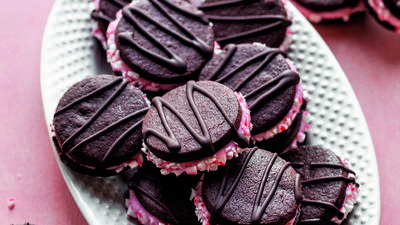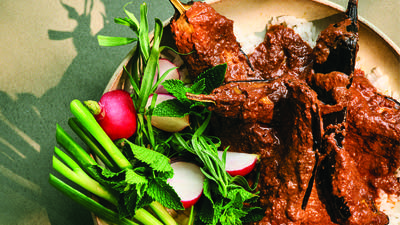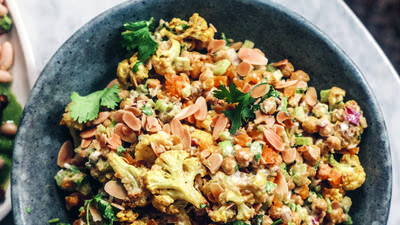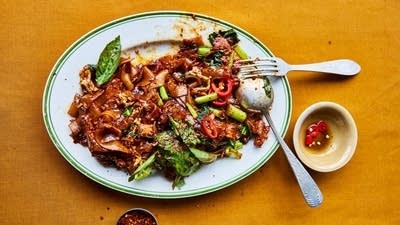
Do you scroll through your Instagram feed, looking all of these gorgeous, perfect food photos, and instead of feeling inspired, you start to feel bad? You are not alone. The British food writer, journalist and historian Bee Wilson says one of life’s greatest joys –- food and eating -- have become fraught with anxiety and confusion. She has a new book called, The Way We Eat Now: How the Food Revolution Has Transformed Our Lives, Our Bodies and our World. Contributor Shauna Sever recently talked with her from London. Also enjoy Shauna and Bee's conversation, Who broke the lunch break? Bee Wilson considers the disappearance of lunchtime.
Shauna Sever: Let's start with the title of your new book, The Way We Eat Now. I want to know who is the “we” and what is the time frame of “now?”
Bee Wilson: Those are very good questions. I was aware when I gave it that title that you could say there is no we because we all eat in such crazily divergent and different ways. But the thought behind the book is – I suppose the now is the past five years, the past 10 years, the past 50 years, because almost everything about how people eat around the world has changed in these tumultuous ways. And the strange thing is that these changes that people have gone through have been the same across continents, across countries. Even if you can't really say there is any we when it comes to food – you know, people differ in their tastes within a single family, never mind across different social groups, people with different budgets, people in different countries – the really weird thing is that we have gone through these common changes.
Someone who I kept returning to his research while I was writing this book is a man called Barry Popkin. He’s a professor of nutrition and he calls this change “the nutrition transition.” It's what happens when countries pass from poverty to affluence, and it has lots of wonderful aspects about it. Never in human history have edible items been so easy to obtain. There've never been so many spices in our stores, so many wonderful different herbs and ingredients, the kinds of things that this podcast celebrates. But on the other hand, never before has diet, this thing would ought to nourish us, been the number-one cause of death and disease in the world. So, it's this weird split picture and the we in my title may not be just one person; I'm trying to write about the whole gamut: the good, the bad, the avocado toast.
 Bee Wilson
Photo: Charlotte Griffiths
Bee Wilson
Photo: Charlotte Griffiths
SS: You touch on that a lot in the book, this idea of the more access to better food we have, the worst we seem to be eating, or rather where we seem to struggle with eating well. Why do you think that is?
BW: I think a huge part of it is that we start to take food for granted. We’re very lucky not to suffer the hunger and famine of our ancestors. I'm not for a moment suggesting that we would want to go back to a time when people thought that bread was the most important thing in their lives because bread was almost the only thing that they had to eat; that's not a good scenario for anyone. But, the upside of when these different communities around the world had a staple food – whether it was rice in China or the various starchy staple roots of Africa to the bread of Europe – was that people actually knew how important food was and they could distinguish a good loaf of bread from a bad loaf of bread
And now, if somebody goes on too much about the quality of sourdough, we think they’re this snobbish person. But, there was a time in 19th century London where everyone was a sourdough snob because you had to know the quality of bread because you had to be very aware of how much of the household budget it used up. You knew the difference between if somebody had sold you a loaf of bread that you thought was going to make your family sick because there were consequences. Whereas now, partly because food is so cheap and partly because it's sold to us in these packaged forms, which means that we don't use our senses to interact with it in the same way, we can almost forget that food really matters. I think part of what needs to happen in the near future is we need to reclaim the central importance of food in our lives.
SS: I find that it's going both ways. We're becoming more obsessed with food because of the access, and at the same time the luxury of having so much choice is causing us to choose poorly. It seems so complicated.
BW: It is complicated. I think there are wonderful things in the mix of the way we eat now. One of the happy stories in my book is - we're always going on about the decline of cooking and we keep being told no one cooks anymore. And so often the story of decline is based on some idea that cooking can only be cooking if it's done by a woman and if she's in the home in a certain way. But, if you actually look at the data that we have – and it's incredibly hard to measure the extent to which anyone cooks because people mean very different things by it – it seems to have actually plateaued off over the past 20 years or so. But, the really positive part of the story is that so many men who never once would have picked up a wooden spoon in a previous generation are now cooking. Not for every meal. Not every day even. But, that's a colossal change that brings all these benefits not just to the people these men might be in a relationship with who aren't necessarily having to cook every day, but for the men themselves. It’s just that wonderful sensual pleasure.
And, as you say, in some ways we're totally obsessed with food. I mean, The Splendid Table is a great example; I listen to it avidly myself. I was just listening to the Thai food episode, picturing those wonderful spices being ground in the pestle and the mortar. We're so open to global flavors in a way that wasn't possible in the past, and that's partly social media and it's partly travel. So, there are these wonderful things happening and at the same time there are these terrifying things happening. The hard thing is to kind of make your way through this baffling, confusing world of food.
SS: You cover the subject from all of those different angles that you just mentioned. That's your style as a food writer; you're always taking a deep dive on a particular subject. I was curious if there's a single moment, experience, or perhaps a concern you had that made you stop and say, “Now, that's my next book: examining modern eating.”
BW: All of the books I've written have changed along the way, and this one probably changed the most. I think it began as a much more lighthearted book and it still has elements of that in it, where I'm writing about things like trends for people suddenly drinking more pomegranate juice or why do we suddenly have so skyr when it used to be a Greek yogurt? I started off thinking, isn't it fascinating when you're shopping for food and somebody has left behind a shopping list of all the ingredients they're planning to buy, and you think what human life lies behind somebody who's wanting to buy a bottle of Pinot Grigio, 500 grams of peaches, and some radicchio lettuce. [both laugh] I mean, there were just these weird combinations – actually that isn't even particularly weird combination, I need to make it stranger.
I kept having those moments of thinking, I'd really like to find out the truth about how we eat. I kept reading these newspaper stories about the obesity crisis or the terrible way that we eat and type 2 diabetes and so on. And I think, well, what do we really know about this? I starting off thinking that I'm doing a kitchen census of how people eat behind closed doors, but then I was even startled by the extent to which I realized this is a global story. So, I've got to tell it not just through the United States, not just through Britain, where I live; I've actually got to widen it out and look at Asia and look at Africa. It got bigger.
So, yes, you're right. I do these books which are a deep dive and I end up writing something that wasn't quite what I imagined at the start. The great thing is I so enjoy doing the research because I just find out so many things. There was so many things that surprised me, such as I had always believed, partly because of so many newspapers, stories about the terrible dangers of sugar in our modern diet, that the substance that would have gone up the most in modern diets with sugar. But, when you look into what has changed over the past 50 years, and this is across the world, yes, sugar's gone up a lot, but actually Americans were already eating a lot of sugar 50 years ago. The thing that's gone up is refined vegetable oils. Soybean oil has gone up 300 percent. And this is a change which is hidden from us. Those were the stories that really gripped and fascinated me.
I buy a lot of bananas myself, even though I don't particularly like bananas, which sounds like a strange thing to say, but they seem like such a useful thing to give to one of my kids when they're hungry and you’re looking for some vaguely healthy snack. I didn't realize that bananas are now the seventh most consumed food in the world, not just fruit but food. The type of banana that almost everyone in the world eats, the Cavendish, it wasn't selected for flavor, it doesn't have a particularly good texture; if we were banana connoisseurs, we would despise the Cavendish banana. And yet, it somehow managed to find its way into our homes. Those were the kind of facts that, as I was going along, kept shaping the narrative because anything that I thought I was that surprised by, I hoped that the reader would find interesting too.
SS: There were so many surprising, really interesting stories in this book. I just couldn't stop. It was like discovering a treasure chest. Because eating is such a huge part of our lives, to see all of these back stories in one place was quite fascinating. One thing I kept coming back to was this definition of healthy eating, how that's evolved, and how it's become almost a status symbol in a way. Did you think a lot about how the definition of healthy eating has changed over time and what it's defined as now?
BW: I did think a lot about that because I feel the way we define healthy eating is ironically now pretty unhealthy. I think it's psychologically unhealthy the way that we attach these moral labels to food. We’ll say, “I'm being good today. I'm having a salad” or “I'm being a bit naughty by having chocolate cake.” And that's absurd. There's nothing naughty about cake.
I did think about how extreme it's become. The way we eat is so polarized now, into junk food on the one hand and health food on the other hand. What gets lost is often just a kind of nourishing, steadying home-cooked bowl of soup. What can actually be healthier than that? But, it doesn't necessarily fit with modern day definitions of what's healthy, particularly if it's got some noodles floating in it and that's carbs and who wants to be eating carbs? It's all of these strange ideas now which are floating around about food.
Some of these extreme reactions make total sense to me. One of the things I write about in the book is this vogue for wellness and clean eating. I believe, and I interviewed a dietician who works with eating disorder sufferers and said the same, that clean eating is a very unhealthy concept because it's suggesting there's such a thing as dirty eating, and it's suggesting that you should chastise yourself purely for pleasure. And, in fact, what could be more natural in the world than taking pleasure in food? It's a very human, very healthy impulse.
 The Way We Eat Now
by Bee Wilson
The Way We Eat Now
by Bee Wilson
SS: And this idea of clean eating almost seems like something to aspire to, and we see so much of it on social media and that's just something that didn't even exist until a few years ago. Tell us your thoughts on how much social media has changed our eating lives and our relationship to food in such a short period of time.
BW: I feel it's changed already with food in some quite profound ways. Like so many of these trends it's been positive and negative. On the one hand, I look at the sort of things I've learned from reading other food writers on Twitter or blogs or other forms of social media, and I sometimes feel I've learned more brilliant, genius cooking tips than I have from my whole library of cookbooks. On the other hand, there's this really toxic form of food on social media, which is people making comparisons, people feeling that there is some kind of perfect life out there, whether it's a perfect pie crust that somehow looks amazing and the lattice is so neat, unlike what you're making at home, and it makes you feel like a failure. Or it's supposedly perfect bodies, perfectly healthy food, perfect green juice in Mason jars. What's with all of that?
It leads to this kind of real homogenization. Look at things like avocado toast. I remember the first time I had that; I was in Australia in a famous cafe run by chef Bill Granger. It seemed so exciting and so exotic and so weird to take avocado and put it on toast. Now, you can't go into a hipster coffee shop anywhere in the world – I've seen avocado toast in Cape Town, South Africa, I've seen it in Paris, I've seen it in London. It's just everywhere. And that's really peculiar. It's as if we're living in this clone world when it comes to food, and social media is a huge part of that.
It's almost as if we don't really know our own tastes anymore and we’re taking our cues about what to eat from other people and from what looks good. Although the look of food is hugely important – a really appetizing looking piece of fruit is going to somehow satisfy you even before you take that first bite – but there are so many other things going on with food, and what we forget is flavor. You could have the most ugly looking plate of brown, nondescript stew, but it could taste and smell wonderful and it could feed all of your other senses. Any yet, nobody's going to put that one on Instagram.
SS: Brown food tastes so good!
BW: I agree! And, we need more honesty about brown food, don’t we? And more burned food. We need to see that sometimes the toast does get burned and you scrape it off and it's okay. Not everything, food included, has to be perfect.
SS: So, what does all of this mean for the home cook? There's just so much information and imagery with social media coming at us. How can we maintain sanity in our home kitchens when everything is ever changing in the world of food?
BW: That's a really good question. I almost think the question is, how do we find sanity in the kitchen? I think, now more than ever, the kitchen is a place of sanity, and that's a huge change from the past. If you think how cooking was for most of human history, it was done by women. Yes, it could be satisfying, but it was drudgery. It was hard work. It was women at the grindstone. It was people who cook because they had no choice in the matter.
Whereas now, the kitchen is this amazing place where we can go to escape the demands of the screen and email just for a few moments. Cooking is therapy now more than ever. Partly because, like most people, I don't manage to cook as much as I dream of cooking. There are these wonderful moments of the weekend when you can luxuriate doing laborious, slow cooking. But, most of the time cooking is the thing that gets squeezed out of our lives. For too long we've been sold this idea, that food marketers have hugely benefited from, that we don't have time to cook. And, who would want to cook if you could buy some packaged food instead? I think there is a small revolution now happening of us starting to realize that no, not every day, we can't cook laborious meals from scratch all of the time. It's really difficult if you're working long hours and you're commuting, so you might not be able to cook at dinner time. But, if you can use a bit of ingenuity and improvise a bit, it is so worth having cooking in your life. It really is.
Before you go...
Each week, The Splendid Table brings you stories that expand your world view, inspire you to try something new, and show how food connects us all. We rely on your generous support. For as little as $5 a month, you can have a lasting impact on The Splendid Table. And, when you donate, you’ll join a community of like-minded individuals who love good food, good conversation, and kitchen companionship. Show your love for The Splendid Table with a gift today.
Thank you for your support.
Donate today for as little as $5.00 a month. Your gift only takes a few minutes and has a lasting impact on The Splendid Table and you'll be welcomed into The Splendid Table Co-op.




